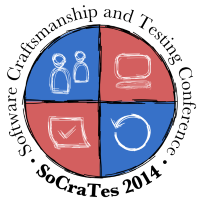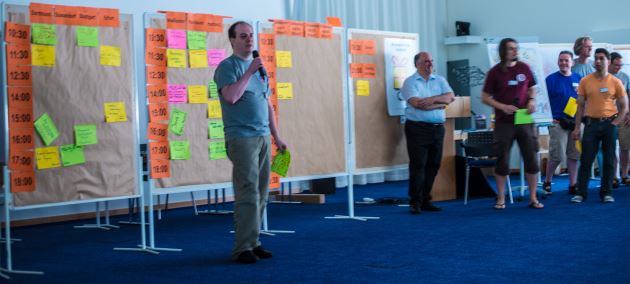Flip-flops, sandals, occasionally a pair of Vibram Five Fingers and some people walking barefoot. It’s the definition of the laid-back spirit at SoCraTes 2014, an unconference I joined last week, made for and by software craftsmen. It was my first ever unconference experience and while I found the format unsuited for my personality, the energizing power of that community was exceptional.

SoCraTes stands for Software Craftsmanship and Testing - an all-in-one statement embodying the aspiration to become better at creating software tomorrow than we were today. That’s all there was available before the event to describe its contents. No calls for papers, no formal agendas, speaker profiles or anything one would expect from a regular conference. All sessions for the day were announced each morning, often sparked by the previous night’s conversations. One literally comes there without knowing what to expect.

For two days, first thing after breakfast, all 150 of us met to fill in the agenda, by pitching sessions and sticking them somewhere onto the grid of available times and spaces - a morning conference-room lecture on micro-services, or perhaps an afternoon debate on freelancing strategies in a garden setting? Anything was possible, because in Open Space Technology:
- Whoever comes is the right people.
- Whenever it starts is the right time.
- Wherever it is, is the right place.
- Whatever happens is the only thing that could have.
- When it’s over, it’s over.
and perhaps most importantly:
Law of two feet If at any time during our time together you find yourself in any situation where you are neither learning nor contributing, use your two feet, go someplace else.
SoCraTes attendees spent days strolling between sessions, then evenings and nights playing board games, learning to juggle, explaining complex software architectures with beer glasses, or mob-programming in Cobol.
People get crazy at #SoCraTes14 Some do #MobProgramming in COBOL http://t.co/eZPjPDDFjQ
— Philipp Riemer (@philipp_riemer) August 10, 2014
So, how was it for me? Mixed.
There are consequences to participating in an unconference. On the positive side, there’s the flourishing creativity. Every single person I met at SoCraTes was passionate about their work to the point of making me ashamed that I didn’t know enough about the field and probably didn’t work hard enough to learn. I actually had to get some work done in-between, just to improve my morale, like finishing a blog post and publishing a microscopic framework for content websites.
On the negative side, however, was a certain level of disorganization and common lack of substance. With no information on sessions published beforehand, there was no way to make a reasonably informed decision about which ones to attend. I had to decide on the spot, at 9 o’clock in the morning of the day, based on titles and 30-second pitches. A few people came with prepared sessions, but many just improvised them.
The result is that most sessions ended up being discussions. A session owner may have introduced the topic and then some of the people present talked through its selected areas. While that’s a useful form for a meeting of peers trying to fill in their gaps in knowledge, it doesn’t work well for the less experienced who would like to learn in a more structured fashion.
In theory, the law of two feet removes the burden of having to sit through a bad session, but in practice leaving one session makes you arrive at another one mid-way, which often makes it difficult to join in and follow the flow of information.
After the two days I didn’t feel I took away much, despite the amazing variety of sessions and the astonishing scope of knowledge of all their attendees.
In Philip Zimbardo’s classification of time perspectives, I’m clearly a future-positive-oriented type. I like to prepare ahead and anticipate what’s coming. I also like concise conference sessions where presenters share the experience of their past work, like describing a specific project, a piece of software they built, and the lessons they took away from it. Concrete, credible, and structured.
Unconferences are great because of the people who attend them. Competent and passionate to the boundaries of craze. That’s what keeps those who enjoyed SoCraTes coming back. They seek renewed inspiration and energy coming from others like them. It’s perhaps the most social gathering of geeks.
For the future I will likely stick to more traditional conference formats, with curated agendas. SoCraTes 2014 was a very well organized event and for anyone who feels comfortable with the format, the upcoming editions will be thoroughly enjoyable.